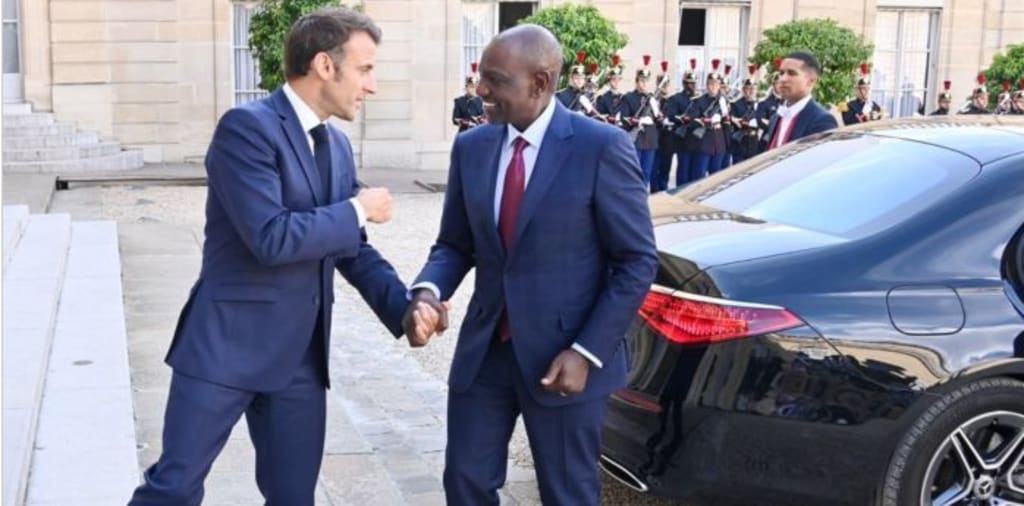France President Emmanuel Macron Responds to Ruto's Plea for Financial Restructuring
Transforming Financial Systems: France President Emmanuel Macron Answers President Ruto's Call

In a significant development, France President Emmanuel Macron has shown his support for President William Ruto's call to restructure financial systems in order to alleviate poverty and revive economies. Macron, who was quick to respond to Ruto's plea, released a statement on Friday, June 23, outlining his commitment to address the issue of financial fragmentation affecting African and underdeveloped countries.
During their meeting in Paris, Macron assured Ruto that his administration would advocate for fair distribution of resources and work towards transforming the governance of the international financial architecture. Macron emphasized the need for efficiency, equity, and relevance in today's world.
"To prevent fragmentation, we will transform the governance of the international financial architecture to make it more efficient, more equitable, and fit for the world of today," Macron declared.
Macron also expressed his intention to accelerate debt suspension and treatments when necessary to provide fiscal space for countries in debt distress. He pointed out the success of the common framework implemented for Chad and Zambia and called for the inclusion of climate resilient debt clauses to support countries affected by disasters.
Additionally, Macron highlighted the importance of fair partnerships and value addition through local processing of raw materials and critical minerals. He further emphasized the commitment to deploying healthcare and food infrastructures to enhance national sovereignty.
President Ruto had earlier appealed to global leaders to lobby for the restructuring of financial systems, stressing the need for a new model where power is not concentrated in the hands of a few. Ruto proposed extending debt repayment regimes, suggesting a 50-year maturing limit with a grace period of 10 to 20 years.
President Macron, in response to Ruto's call, reiterated the necessity for a bold and targeted approach to address global challenges. He emphasized the importance of an inclusive discussion on climate change, ensuring that no nation, including China, is left behind.
The joint efforts of President Ruto and President Macron present a significant step towards reshaping the financial architecture to promote fairness, inclusivity, and sustainability. By working together, they aim to create a financial system that benefits all nations, particularly those struggling with poverty and debt.
It is encouraging to witness leaders like President Macron taking proactive measures to address the financial challenges faced by African and underdeveloped countries. Their commitment to transforming the international financial architecture provides hope for a more equitable and prosperous future. As the world tackles pressing issues such as poverty, debt, and climate change, collaborative efforts and inclusive discussions are essential to fix the existing imbalances and build a better world for all.
In a world marked by increasing inequality and economic disparities, the decision of France President Emmanuel Macron to support President William Ruto's plea for financial restructuring is a commendable step towards a fairer global financial system. Macron's acknowledgment of the need to address financial fragmentation and his commitment to transformative actions send a strong message of solidarity and partnership.
President Ruto's call for a new financial model that decentralizes power and ensures a more equitable distribution of resources resonates with the aspirations of many African and underdeveloped nations. The overreliance on institutions like the World Bank and the International Monetary Fund (IMF) has often perpetuated a system that favors the few, hindering sustainable development and exacerbating poverty.
By advocating for the transformation of the international financial architecture, Macron recognizes the urgency of making the system more efficient, inclusive, and relevant to the current global landscape. This move paves the way for constructive discussions and innovative solutions that address the root causes of financial fragility and promote economic growth.
The commitment to accelerating debt suspension and treatments for countries in debt distress demonstrates Macron's understanding of the challenges faced by nations burdened with overwhelming debt. By providing fiscal space and relief, these countries can redirect resources towards poverty alleviation, infrastructure development, and social programs, fostering sustainable and inclusive growth.
President Macron's emphasis on fair partnerships and value addition through local processing of raw materials and critical minerals aligns with President Ruto's vision of transforming Africa's potential into economic strength. By promoting local industries and empowering nations to add value to their resources, Macron recognizes the importance of building self-sufficiency and reducing dependency on external actors.
Moreover, Macron's commitment to deploying healthcare and food infrastructures to increase national sovereignty highlights the significance of investing in essential sectors that directly impact the well-being of populations. Strengthening healthcare systems and enhancing food security are crucial steps towards building resilient nations capable of withstanding future challenges.
President Macron's call for an inclusive discussion on climate change is both timely and necessary. Climate change poses a significant threat to all nations, and collaboration is essential to mitigate its impact. By emphasizing the need to include all countries, including major players like China, in climate discussions, Macron highlights the importance of global cooperation and shared responsibility in addressing this pressing issue.
The partnership between President Ruto and President Macron reflects a shared commitment to reshaping the global financial system to ensure a fairer, more inclusive, and sustainable future. Their collaboration sets an example for other leaders to follow and encourages collective action in tackling the complex challenges faced by underdeveloped countries.
As we move forward, it is crucial that these declarations and commitments translate into tangible actions. Sustained efforts, backed by comprehensive policy reforms, are necessary to bring about meaningful change. By leveraging their positions of influence, President Ruto and President Macron have the potential to spearhead a global movement towards a more just and equitable financial order.
The joint efforts of these leaders give hope to millions of people who have long struggled under the weight of poverty and debt. It is a testament to the power of dialogue, diplomacy, and international cooperation in driving positive change. As the world grapples with multiple crises, it is essential that leaders continue to prioritize the well-being of their people and work together towards a brighter, more inclusive future for all.
About the Creator
Anthony Gatimu
Being a writer,It requires constancy, discipline, and vulnerability.But inside that weakness lies your most noteworthy strength, for it is through your weakness that you interface with perusers on a significant level.






Comments
There are no comments for this story
Be the first to respond and start the conversation.